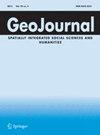Climate change in the Sidama region, Ethiopia: linking perceptions and adaptation
IF 1.9
Q2 GEOGRAPHY
引用次数: 0
Abstract
Abstract Climate change is expected to have serious socioeconomic impacts on smallholder agriculture, but overall impacts will also depend on the extent of household adaptation to climate change. This study investigates household-level factors that may help describe and explain perceptions about climate change and examine how these perceptions influence choices related to specific land-use adoption strategies. Logistic regressions were applied to address these objectives. Cross-sectional survey data were derived from 315 randomly selected smallholder mixed farmers in Ethiopia. The results indicate that a significant number of farmers believe that temperatures have increased over the last 10–20 years and that precipitation has declined. Education, agroecological settings, and social capital significantly influenced perceptions of increased temperature. Gender, distance, access to climate change information, and social capital significantly influenced perceptions of reduced rainfall. The odds of decisions to adopt specific land-use adaptation measures to climate change are significantly influenced by perceived changes in rainfall and temperature but also by social, human, and natural capital access. Adoption is also linked to gender, distance to markets, access to climate change information, and farm location. Thus, rural interventions aimed at addressing more general agricultural adaptation to climate change should account for these factors.埃塞俄比亚西达马地区的气候变化:将认知与适应联系起来
气候变化预计会对小农农业产生严重的社会经济影响,但总体影响还取决于家庭对气候变化的适应程度。本研究调查了家庭层面的因素,这些因素可能有助于描述和解释对气候变化的看法,并研究这些看法如何影响与具体土地使用采用策略相关的选择。应用逻辑回归来解决这些目标。横断面调查数据来自埃塞俄比亚315名随机选择的小农混合农户。结果表明,相当多的农民认为,在过去的10-20年里,气温上升了,降水减少了。教育、农业生态环境和社会资本显著影响温度升高的感知。性别、距离、获取气候变化信息的途径和社会资本显著影响了人们对降雨量减少的看法。针对气候变化采取具体土地利用适应措施的决策几率受到降雨量和温度的感知变化以及社会、人力和自然资本获取的显著影响。收养还与性别、与市场的距离、获取气候变化信息的途径和农场位置有关。因此,旨在解决更普遍的农业适应气候变化问题的农村干预措施应该考虑到这些因素。
本文章由计算机程序翻译,如有差异,请以英文原文为准。
求助全文
约1分钟内获得全文
求助全文
来源期刊

GEOJOURNAL
GEOGRAPHY-
CiteScore
4.90
自引率
7.40%
发文量
228
期刊介绍:
Aims & ScopeGeoJournal is an international journal devoted to all branches of spatially integrated social sciences and humanities. This long standing journal is committed to publishing cutting-edge, innovative, original and timely research from around the world and across the whole spectrum of social sciences and humanities that have an explicit geographical/spatial component, in particular in GeoJournal’s six major areas:- Economic and Development Geography- Social and Political Geography- Cultural and Historical Geography- Health and Medical Geography- Environmental Geography and Sustainable Development - Legal/Ethical Geography and Policy
In addition to research papers GeoJournal publishes reviews as well as shorter articles in the form of research notes, commentaries, and reports. Submissions should demonstrate original and substantive contributions to social science and humanities from a geographical perspective. Submissions on emerging new fields such as GeoEthics, Neogeography, Digital Humanities and other emerging topics are also welcome.
GeoJournal’s focus makes the journal essential reading for human geographers working in these areas, as well as for researchers from other disciplines, such as sociology, economics, political science, demography, environmental studies, urban planning, history, and cultural studies.
Last but not least, GeoJournal encourages feedbacks and discussions on articles published in the journal through letters to the editor.
GeoJournal is published bi-monthly in February, April, June, August, October and December.
 求助内容:
求助内容: 应助结果提醒方式:
应助结果提醒方式:


